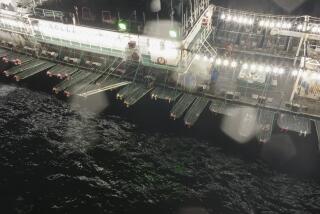A Shell Game Down Under Where the Stakes Are High
- Share via
From the deck of the Alcyone we see the frail wooden boats rise and fall on the turquoise Australian waters. Under a blistering sun, we are cooled by the same sea breeze that has carried these precarious vessels across the ocean from Indonesia to the remote northwestern Australian coast.
The journey is only about 40 miles, but a storm would splinter the boats into pieces. Aboard, the Indonesian sailors--just boys, really--sleep on deck in all weather. Supplied with three basics--fuel, rice and fresh water--they put to sea in barely seaworthy ships.
They are trochus fishermen, and they are desperate.
The lustrous trochus shell is in high demand on international markets. It is ideal for making pearl buttons, easily punched from the lacquer-like white spiral cone.
But the trochus has been greatly overfished in Indonesian waters, and many Indonesian reefs have been raped by fishermen using dynamite to stun fish and reap a quick catch. With their reefs now blown apart, the trochus fishermen have no livelihood left at home, so they risk their lives to venture to other trochus beds farther and farther away.
Their boats, only 20 or 30 feet long, never see maintenance. Those with engines break down all the time. Parts are makeshift, propellers snap.
The success of the trip often is determined by something as simple as how much fresh water a boat can carry. If you run out, you must turn back before reaching Australia. So you might take a chance drinking brackish water on an outlying island en route, where a sign warns you not to drink. But then, to fish trochus shells you knowingly risk cholera.
If the boats keep running and the water holds out for three weeks at sea, fishermen will load each craft with 2 or 3 tons of trochus. Holding their breath, the fishermen dive down about 30 feet, pluck the trochus from their hiding places, then quickly surface and stuff the catch under the main deck. At night, they sleep above its rotting smell.
An inedible snail, the trochus takes three years to grow to 6 inches--a marketable size--and it’s only the shell that counts.
Trochus fishermen earn about $10 or $15 a trip, roughly $5 a week. The wholesalers to whom they turn over their catch sell it for about $6,000 a ton.
Besides drowning and getting sick from drinking bad water, the fisherman face another formidable worry--arrest by the Australian Coast Guard, which takes the policing of Australian waters very seriously.
The Australians ban motor craft from fishing for trochus, and they require that sailing boats carry a permit. But violators can be found all along the coast.
Authorities stop illegal boats, then tow them to the nearest port. The sailors are confined to their ships and provided with food while awaiting settlement of their cases. Sometimes the process takes a couple of months.
First offenders are simply deported--put on an Australian plane and flown home. Repeat offenders end up with nine months in prison. The Indonesians try to avoid repeat convictions by using different names. The Australians, wise to this tactic, now keep a mug book.
For those convicted of illegal fishing, more than time is at stake. Their arrest can cost them the only bank account they have--their boat.
I was in Broome, in northwest Australia, as the Coast Guard cut down the flimsy masts of 21 illegal boats, loaded the vessels onto trailers and took them inland to a “boat cemetery.” The sailors were brought along, too.
They were asked to clear the boats of their belongings and put them in a pile. Before the sailors’ eyes, all their baskets, ragged clothes, personal effects, were set afire. Then the boats too were set aflame by the Coast Guard.
As I mingled with these fishermen, I felt a variety of conflicts: Admiration at the courage required by their livelihoods; despair at their pillaging of the environment; frustration at the poverty that leads them to risk their lives for a pittance.
I was more than unsettled to watch frightened Indonesian sailors stripped of every possession. Yet I understood clearly the Australian conservation motives. They believe the only way to control poaching of their reefs is to make examples of the offenders, which means mobilizing the judicial system to discourage sailors who earn less than a dollar a day.
Ironically, the depletion of their own oceans puts the Indonesians in the jaws of the Australian police.
Yet the concern is theoretical--you just might get away with it. To the fisherman asleep on the first calm night at sea, a hold of shells to deliver, it has all been worth the risk.
More to Read
Sign up for The Wild
We’ll help you find the best places to hike, bike and run, as well as the perfect silent spots for meditation and yoga.
You may occasionally receive promotional content from the Los Angeles Times.






